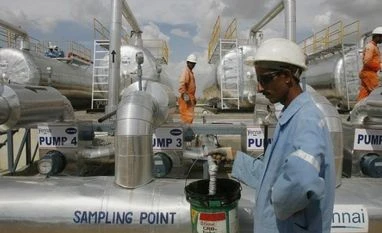Legal breather for Cairn India
Rajasthan HC upholds CST on Barmer crude
)
Cairn India employees work at a storage facility for crude oil at Mangala oil field at Barmer in Rajasthan
There is a silver lining amidst the litany of legal battles facing the oil and gas exploration major Cain India. The Rajasthan High Court, in a tax dispute between Cairn India and the state government, has held that supply of crude oil from fields in the state to buyers in Gujarat and Karnataka amounts to inter-state sale.
The judgement - which will impact past and future tax assessments - implies that Cairn's crude oil sales from the Barmer oil fields in Rajasthan are liable to attract central sales tax at two per cent. The state government had imposed VAT at four per cent since assessment year 2009-10 onwards.
According to initial estimates by tax experts, a higher tax rate of four per cent would have meant an additional tax outgo of up to Rs 1,000 crore for Cairn India.
Also Read
Experts added that the favourable ruling will help Cairn India in the GST regime since petroleum products are outside the GST net.
Cairn India did not respond to questions around implications of the judgement on the company.
Legal experts expect the state government to appeal against the judgement in the divisional bench of the Rajasthan High Court.
Advaita Legal was the legal counsel for Cairn India.
In this case Cairn India had entered into product-sharing contract with the central government for sale of crude oil from fields at Barmer only to government-nominated suppliers.
The point of sale was recognised as within Rajasthan. The state government invoked VAT of four per cent, calling it an intra-state transaction. This was challenged by Cairn India in the Rajasthan High Court.
Relying on the Supreme Court ruling in the Balabhagas Hulaschand versus State of Orissa case, the Rajasthan High Court held that if the movement of goods from one state to another is the result of, or incident of contract of sale, then such sale is an "inter-state sale".
So VAT was not applicable to the supply of crude oil from Rajasthan to the central government-nominated buyers in Gujarat and Karnataka, despite the point of delivery being within the state, the high court said.
Legal experts said the judgment could impact Rajasthan's nascent revenue realisation from crude oil and natural gas.
According to the website of state's department of petroleum, the total CST/VAT revenue of the government from crude oil and natural gas was Rs 228 crore in 2010-11: CST at two per cent for crude and VAT at five per cent on natural gas.
These rose to Rs 473.29 crore in 2011-12, Rs 666.57 crore in 2012 -13 and Rs 760.11 crore in 2013 - 14.
Cairn India and Cairn Energy have been involved in several legal battles over the years. This includes on-going international arbitration on tax dispute with government of India (being overseen by the Delhi High Court).
In 2014, the government levied a Rs 29,000-crore tax demand (including penalties) on Cairn Energy for alleged capital gains made by the company on transfer of its India assets. In retaliation Cairn Energy has made a claim for $5.6 billion in compensation and $1.05 billion in loss of share value.
As a corollary to this case, the government is not allowing the 2011 Cairn India-Vedanta Ltd merger. The assets of Cairn Energy (9.8 per cent) are frozen and cannot be transferred to Vedanta. There is a dispute between Cairn India and the Director General of Foreign Trade over export of excess production of crude oil from the Barmer oil fields.
| RECENTLY CONCLUDED AND ONGOING CAIRN ENERGY & CAIRN INDIA CASES |
Recently concluded case between Cairn India and Government of Rajasthan in the Rajasthan High Court
|
-
Cairn wants to sell oil abroad as domestic price caps are far less than international prices
- Government is opposing the demand - Cairn claims that there is no bar against the export under the existent foreign trade policy
More From This Section
Don't miss the most important news and views of the day. Get them on our Telegram channel
First Published: Jul 21 2016 | 12:38 AM IST


